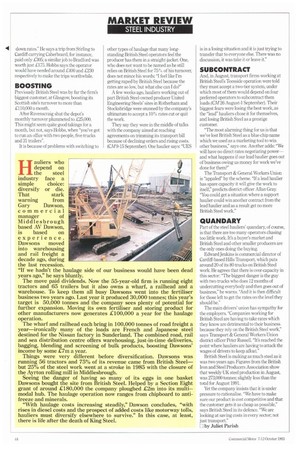MARKET REVIEW
Page 46

If you've noticed an error in this article please click here to report it so we can fix it.
STEEL INDUSTRY
down rates." He says a trip from Stirling to Cardiff carrying Caberboard, for instance, paid only £305; a similar job to Bradford was worth just £175. Hobbs says the operator would have needed around £400 and £230 respectively to make the trips worthwhile.
BOOSTING
Previously British Steel was by far the firm's biggest customer, at Glasgow, boosting its Scottish site's turnover to more than £110,000 a month.
After Ravenscraig shut the depot's monthly turnover plummeted to £25,000. This might seem quite good takings for a month, but not, says Hobbs, when "you've got to run an office with two people, five trucks and 31 trailers".
It is because of problems with switching to
other types of haulage that many longstanding British Steel operators feel the producer has them in a straight-jacket. One, who does not want to be named as he still relies on British Steel for 75% of his turnover, does not mince his words: "I feel like I'm getting raped by British Steel because the rates are so low, but what else can I do?"
A few weeks ago, hauliers working out of part British Steel-owned producer United Engineering Steels' sites in Rotherham and Stocksbridge were stunned by the company's ultimatum to accept a 10% rates cut or quit the work.
They say they were in the middle of talks with the company aimed at reaching agreements on trimming its transport bill because of declining orders and rising costs. (CM9-15 September). One haulier says: TES is in a losing situation and it is just trying to transfer that to everyone else. There was no discussion, it was take it or leave it."
SUBCONTRACT And, in August, transport firms working at British Steel's Teesside operation were told they must accept a two-tier system, under which most of them would depend on four preferred operators to subcontract them loads (CM25 August-1 September). Their biggest fears were losing the best work, as the "lead" hauliers chose it for themselves, and losing British Steel as a prestige customer.
"The most alarming thing for us is that we've lost British Steel as a blue-chip name which we used as a marketing tool to win other business," says one Another adds: "We will have no direct rates negotiating power and what happens if our lead haulier goes out of business owing us money for work we've done for them?"
The Transport & General Workers Union is "appaled" by the scheme. "If a lead haulier has spare capacity it will give the work to itself," predicts district officer Allan Gray. "You could get a situation where a support haulier could win another contract from the lead haulier and as a result get no more British Steel work."
QUANDARY
Part of the steel hauliers' quandary of course, is that there are too many operators chasing too little work. It's a buyer's market and British Steel and other smaller producers are the only ones doing the buying.
Edward Jenkins is commercial director of Cardiff-based Hills Transport, which puts around 20 of its 80 trucks on British Steel work. He agrees that there is over-capacity in this sector: "The biggest danger is the guy with two trucks who does 12 months of undercutting everybody and then goes out of business," he warns. "And it is then difficult for those left to get the rates on the level they should be."
The main drivers' union has sympathy for the employers. "Companies working for British Steel are having to take rates which they know are detrimental to their business because they rely on the British Steel work," says Transport & General Workers Union district officer Peter Russell. "It's reached the point where hauliers are having to attack the wages of drivers to keep afloat."
British Steel is making as much steel as it was two years ago. Figures from the British Iron and Steel Producers Association show that weekly UK steel production in August, was 273,000 tonnes; slightly less than the total for August 1991.
Yet the company insists that it is under pressure to rationalise. "We have to make sure our product is cost competitive and that the customer gets it as cheap as possible," says British Steel in its defence. "We are looking at saving costs in every sector; not just transport."
El by Juliet Parish




























































































